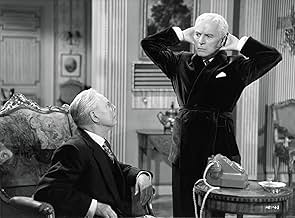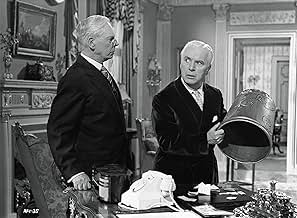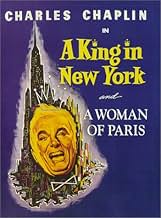IMDb RATING
7.0/10
9.4K
YOUR RATING
A recently-deposed European monarch seeks shelter in New York City, where he becomes an accidental television celebrity and is later wrongly accused of being a Communist.A recently-deposed European monarch seeks shelter in New York City, where he becomes an accidental television celebrity and is later wrongly accused of being a Communist.A recently-deposed European monarch seeks shelter in New York City, where he becomes an accidental television celebrity and is later wrongly accused of being a Communist.
- Awards
- 1 win & 1 nomination total
- Director
- Writer
- All cast & crew
- Production, box office & more at IMDbPro
Featured reviews
When I rented this movie, I had no idae what to expect. Charlie Chaplin in a talkie?! I had just seen (heard?) how poor Buster Keaton's awful voice destroyed his presence as the classic stone-faced pantomine. Might Mr. Chaplin's performance in a speaking role be as sadly disappointing???
The answer in a resounding word was, "NO!" If anything, Chaplin's voice and accompanying ability to express himself with words enhanced his screen presence by providing a new dimension with which to appreciate his seemingly limitless talent.
I'm not sure just how to explain this other than the fact that I watched most of the film with a big grin glued to my face. I marvelled at the subtleties of Chaplin's performance which distinguish him not only as a silent movie actor, but as an actor of ANY era! In today's world of over-the-top silliness and questionable acting passing as good comedy, his performance is a clear indication that intelligent comedy is not an oxymoron and that the "King" of it is the same person as the king of slapstick.
If you're the kind of person who appreciates the subtlety in Woody Allen's humor, you will find yourself marvelling at "A King in New York" and you will see (and hear!) a part of Charlie Chaplin you may not ever have known existed.
The answer in a resounding word was, "NO!" If anything, Chaplin's voice and accompanying ability to express himself with words enhanced his screen presence by providing a new dimension with which to appreciate his seemingly limitless talent.
I'm not sure just how to explain this other than the fact that I watched most of the film with a big grin glued to my face. I marvelled at the subtleties of Chaplin's performance which distinguish him not only as a silent movie actor, but as an actor of ANY era! In today's world of over-the-top silliness and questionable acting passing as good comedy, his performance is a clear indication that intelligent comedy is not an oxymoron and that the "King" of it is the same person as the king of slapstick.
If you're the kind of person who appreciates the subtlety in Woody Allen's humor, you will find yourself marvelling at "A King in New York" and you will see (and hear!) a part of Charlie Chaplin you may not ever have known existed.
A King In New York was a pure delight to watch. Seeing perhaps the greatest actor of the first half of the century is always a treat and he doesn't disappoint in this film. Chaplin made this satire as a shot at the United States, who only five years earlier had denied him re-entry into the country. This was based on the fact he wouldn't come before the McCarthy hearing and make a statement on his supposed ties to the Communist party. Regardless of the basis for this film's comedy pieces, one can find a few moments where Chaplin is taking a direct shot at those who had doubted him.
The plot involves Chaplin as King Shadov, a ruler of a ficticious country whose people have ousted him based on his unwillingness to manufacture Atomic Bombs. He would rather spend the taxpayers money on finding ways to create atomic energy. Obviously this is a deliberate analogy of Chaplin being thought of as a communist although the complete opposite was the truth. So, the exiled leader goes to America in search of a fun vacation in which he can experience the excitement that he had heard about so many times before. The viewer follows Shadof and his trust aide throughout New York City and their many hilarious experiences. The best of which that come to mind are the scenes in which Chaplin pantomimes his order to a waiter who cannot hear him, the scene in which Chaplin recites the famous "to be or not to be" soliloque from Hamlet to guests at a dinner party and the scene in which Chaplin gets his finger stuck in a fire hose and cannot get it out.
One can see some elements of the tramp in Chaplin in this film including the facial expressions, his smile and the way he moves about gracefully. I had never seen Chaplin in a talking film before this one and was somewhat surprised to see how much of a great talking actor he truly is. For an actor who had done so much in silent films and only silent films, this film shows that Chaplin is one of the top actors of this century.
The only element of this film that somewhat disappointed me was the manner in which the hearings were brushed off. I believe that there was plenty of room for some gags to be thrown in here. Perhaps Chaplin felt as if he had already taken enough shots and didn't need to exploit this area.
This film is yet another example of the Chaplin greatness and I would recommend it to anyone who loves films or are interested in seeing film making magic.
8/10 stars.
The plot involves Chaplin as King Shadov, a ruler of a ficticious country whose people have ousted him based on his unwillingness to manufacture Atomic Bombs. He would rather spend the taxpayers money on finding ways to create atomic energy. Obviously this is a deliberate analogy of Chaplin being thought of as a communist although the complete opposite was the truth. So, the exiled leader goes to America in search of a fun vacation in which he can experience the excitement that he had heard about so many times before. The viewer follows Shadof and his trust aide throughout New York City and their many hilarious experiences. The best of which that come to mind are the scenes in which Chaplin pantomimes his order to a waiter who cannot hear him, the scene in which Chaplin recites the famous "to be or not to be" soliloque from Hamlet to guests at a dinner party and the scene in which Chaplin gets his finger stuck in a fire hose and cannot get it out.
One can see some elements of the tramp in Chaplin in this film including the facial expressions, his smile and the way he moves about gracefully. I had never seen Chaplin in a talking film before this one and was somewhat surprised to see how much of a great talking actor he truly is. For an actor who had done so much in silent films and only silent films, this film shows that Chaplin is one of the top actors of this century.
The only element of this film that somewhat disappointed me was the manner in which the hearings were brushed off. I believe that there was plenty of room for some gags to be thrown in here. Perhaps Chaplin felt as if he had already taken enough shots and didn't need to exploit this area.
This film is yet another example of the Chaplin greatness and I would recommend it to anyone who loves films or are interested in seeing film making magic.
8/10 stars.
... while he himself was basically exiled in a strange land. 1957's "A King in New York" shows Chaplin at the end of his film career. In fact, it is the last film in which Chaplin himself stars. Refused permission to reenter the U.S. in 1952 due to the idea that he held anti-American beliefs, he actually made this film about a deposed European king in New York in England. The film suffers from production values that are not as high as they were in Chaplin's earlier films, and if you have the version Warner Brothers put out in 2004, the commentary points out that Chaplin had much trouble making this film mainly because he was not dealing with familiar personnel in his own studio as he had in his earlier efforts. The film's political statements are heavy-handed, but there are still some good comic turns by Chaplin and his viewpoints and comic bits on America and rampant commercialism and consumerism still hold up today. In fact, they are probably much more relevant today than they were when this movie was first made.
If you are curious about Chaplin's work you need to eventually view this film, just don't start your journey here. If you are just starting out, I recommend you view Chaplin's Mutual Comedies. These are 12 two-reel comedies Chaplin made in 1916 and 1917 and show his comic technique evolve from the pants-kicking fests of his Essanay and Keystone films into the sophisticated technique he had from the end of the series onward. Also, the Mutual period was named by Chaplin himself as the era in both his personal and professional life in which he was the happiest.
If you are curious about Chaplin's work you need to eventually view this film, just don't start your journey here. If you are just starting out, I recommend you view Chaplin's Mutual Comedies. These are 12 two-reel comedies Chaplin made in 1916 and 1917 and show his comic technique evolve from the pants-kicking fests of his Essanay and Keystone films into the sophisticated technique he had from the end of the series onward. Also, the Mutual period was named by Chaplin himself as the era in both his personal and professional life in which he was the happiest.
With his country in revolt, King Shahdov escapes to New York. His funds soon start to run dry so he uses his fame to make money appearing in advertisements. He helps a boy who has run away from home but this lands him in trouble with the communist witch-hunt of the time.
A Charlie Chaplin comedy that, like many of his comedies, contains some interesting social commentary.
It starts entertainingly enough, with King Shahdov's escape and his settling into New York. The "forthcoming attractions" during his visit to a cinema are hilarious and made me think this could rival Chaplin's classic comedies like City Lights, Modern Times, The Gold Rush, The Kid, The Circus and The Great Dictator.
Unfortunately, however, the comedy, and the film in general, is a bit uneven. There's some very funny moments but then also some scenes that just fall flat, e.g. The scenes involving his appearance at the school were largely quite irritating. The appearance of Dawn Addams as Ann Kay was a major positive though...
The drama side is also a bit weak and the sub-plot involving the boy initially seemed to more rely on empty sentimentality and some silly hijinks than anything else. However, this does evolve into a decent examination on the absurdity of the communist witch-hunts of the late-40s and early-50s. The subject is quite a personal one for Chaplin as the FBI used these witch-hunts as part of their campaign against Chaplin and this drove him out of the US.
Unfortunately, while the McCarthyism sub-plot is reasonably profound and has a satisfactory conclusion, it is resolved far too quickly, making it seem like a quaint little add-on to the main plot. Chaplin could have done much more with this and made it the main focus of the film. Considering how personal the topic was for him, I'm surprised he didn't.
Ultimately a reasonably entertaining and profound film.
A Charlie Chaplin comedy that, like many of his comedies, contains some interesting social commentary.
It starts entertainingly enough, with King Shahdov's escape and his settling into New York. The "forthcoming attractions" during his visit to a cinema are hilarious and made me think this could rival Chaplin's classic comedies like City Lights, Modern Times, The Gold Rush, The Kid, The Circus and The Great Dictator.
Unfortunately, however, the comedy, and the film in general, is a bit uneven. There's some very funny moments but then also some scenes that just fall flat, e.g. The scenes involving his appearance at the school were largely quite irritating. The appearance of Dawn Addams as Ann Kay was a major positive though...
The drama side is also a bit weak and the sub-plot involving the boy initially seemed to more rely on empty sentimentality and some silly hijinks than anything else. However, this does evolve into a decent examination on the absurdity of the communist witch-hunts of the late-40s and early-50s. The subject is quite a personal one for Chaplin as the FBI used these witch-hunts as part of their campaign against Chaplin and this drove him out of the US.
Unfortunately, while the McCarthyism sub-plot is reasonably profound and has a satisfactory conclusion, it is resolved far too quickly, making it seem like a quaint little add-on to the main plot. Chaplin could have done much more with this and made it the main focus of the film. Considering how personal the topic was for him, I'm surprised he didn't.
Ultimately a reasonably entertaining and profound film.
Now, I've yet to see A COUNTESS FROM HONG KONG, but out of Chaplin's full-length talkies, I didn't find A KING IN NEW YORK terrible by any stretch. In fact-- and I might lose cinephile points for admitting it-- I'd take this over the more prestigious LIMELIGHT any day! It's less self-indulgent and self-loving, and the satire of American media culture still mostly works.
Why does this get so much hate? Maybe it's the film's roughness. It's clearly set-bound and those sets do look cheap most of the time. But money can't buy inspiration, and I think this movie has more than enough inspiration to make up for its lesser production values. Many of the vignettes are delightful and the bittersweet edges (the subplot with Shadov's estranged queen, the character arc of the philosophical young boy) lend this film a great deal of memorability.
Why does this get so much hate? Maybe it's the film's roughness. It's clearly set-bound and those sets do look cheap most of the time. But money can't buy inspiration, and I think this movie has more than enough inspiration to make up for its lesser production values. Many of the vignettes are delightful and the bittersweet edges (the subplot with Shadov's estranged queen, the character arc of the philosophical young boy) lend this film a great deal of memorability.
Did you know
- TriviaThe first film that Sir Charles Chaplin made in the UK after his exile from America, and his last leading role in a movie.
- GoofsDuring his diatribe, Rupert claims that the Roman Empire fell with the assassination of Caesar. Caesar's assassination occurred 17 years before the Roman Empire was established.
- Quotes
[after being told that the political turmoil in America is just a "passing phase."]
King Shahdov: Quite so. In the meantime, I'll sit it out in Europe.
- Alternate versionsOriginal British prints run about five minutes longer than the version that was released in America in 1976. It is this American version that is available on video, but the British cut is available on disc.
- ConnectionsEdited into Histoire(s) du cinéma: Fatale beauté (1994)
- How long is A King in New York?Powered by Alexa
Details
- Release date
- Countries of origin
- Official sites
- Language
- Also known as
- Un rey en Nueva York
- Filming locations
- Production company
- See more company credits at IMDbPro
Box office
- Gross worldwide
- $910
- Runtime1 hour 50 minutes
- Color
Contribute to this page
Suggest an edit or add missing content




































